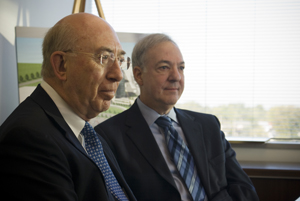John Niederhuber, M.D., knows only too well the ravages of cancer.
The director of the National Cancer Institute (NCI) lost his wife, Tracey, to breast cancer in 2001 at the age of 50. She had battled the disease for 22 years.
“It’s not like having a heart attack where you just drop over,” said Dr. Niederhuber, who visited UNMC last Tuesday. “It physically destroys individuals and is very tough on families. The quality of life is eaten away.”
 |
National Cancer Institute Director John Niederhuber, M.D., left, with UNMC Eppley Cancer Center Director Ken Cowan, M.D., during Dr. Niederhuber’s visit to UNMC last week. (Andrew E. Nelson/UNMC public relations) |
He left town impressed.
“It was a wonderful day, sharing unbelievable science,” he told a dinner crowd of about 200 people who heard him deliver the Michael and Gail Yanney and William and Lisa Roskens Lectureship. “Ken (Cowan) has done a tremendous job of leading the center.”
Key points of Dr. Niederhuber’s lecture included:
- The need to get new drugs approved within 5 to 6 years (not the 10 or more years it currently takes);
- The importance of patient selection and biopsies in the next generation of clinical trials; and
- The need to match patients with a specific drug treatment based on the genome sequence of their cancer.
The tremendous breakthroughs in genome sequencing have revolutionized cancer care, Dr. Niederhuber said. Within the next 10 years, he predicts patients will be able to get a complete genome sequence from their physicians with the same ease as a glucose tolerance test.
Dr. Cowan noted the growth of the UNMC Eppley Cancer Center over the past decade. Highlights include:
- The addition of 100 new faculty;
- A more than three-fold increase in cancer research funding, which went from $19 million in 1999 to more than $67 million today; and
- The creation of clinical trial partnerships with hospitals in Grand Island, Hastings, North Platte and Scottsbluff.